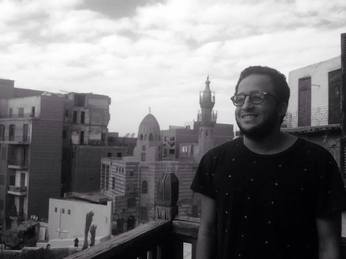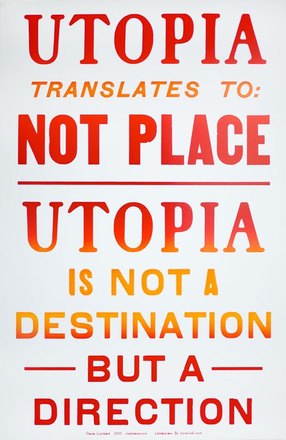"The here and now is a prison house. We must strive, in the face of the here and now’s totalizing rendering of reality, to think and feel a then and there. Some will say that all we have are the pleasures of this moment, but we must never settle for the minimal transport; we must dream and enact new and better pleasures, other ways of being in the world, and ultimately new worlds."
Jose Munoz
“The most tragic form of loss isn't the loss of security; it's the loss of the capacity to imagine that things could be different.”
Ernst Bloch
This course offers an overview to Utopia and Utopianism. The word Utopia was coined by Thomas Moore in his 1516 novel “Utopia”, to describe a “perfect” ideal city that the novel takes place, and etymologically It means the good place that is no place or the good place that doesn’t exist. This word went to become a literature genre, reflecting good places (utopias) and bad places (dystopia). Utopianism on the other hand can be defined as social dreaming, or the dreams and imaginations of a society or the concept/idea of utopia and its pursuit for the good place.
We start by defining utopia through literature and theory from the field of Utopian studies. This course also means to investigate the relationship between imagination and fiction from one side and the sociopolitical from the other. The course starts from conceiving Utopia as the education of desire and Utopia as hope and it speaks to the “utopian impulse” in humans for a better life. Utopia as a vision of the “good life” starts from refusing the present and locating the potentialities and possibilities of better life. Also this course moves beyond theory to look at the everyday life utopianism and how utopia can be used as a vehicle for radical transformation. Because of the special nature of utopia, this course is an interdisciplinary between the arts and the social sciences. It’s meant to be a collective exploration and the reflections of the participants are important to the outcome of the course .We will be reading the work of Ernst Bloch, Ruth Levitas and Lyman Tower Sargent among others.
The course objective is to offer an introduction to the concept of utopia and how can we use it to critically think about the social, political and the personal. It gives an overview of the field of utopian studies, different themes within it and the current trends. To challenge the common misconceptions about utopia. To question utopia and its relevance to today’s realities. It will also explore these topics in a way that makes justice to the imaginative, radical, poetic and artistic nature of Utopia.
" ما نحن فيه و ما هو الآن هما سجن. يجب أن نكافح في وجه القوة الشمولية لما نحن فيه و ما هو الآن في تشكيل الواقع، لنفكر و نشعر بمكان آخر ووقت آخر. قد يقول البعض ان كل ما لدينا هي متع هذ اللحظة، و لكننا لا يجب ان نتوقف عن الكفاح، يجب ان نحلم، و نخلق متع جديدة وطرق مختلفة للتواجد في العالم و في نهاية المطاف عوالم جديدة ".
خوسيه مونوز-
"اكثر الخسائر مأساوية ليس فقدان الأمن، بل هي فقدان القدرة على تخيل أن الأمور يمكن أن تكون مختلفة".
إرنست بلوخ-
يقدم هذا المساق نظرة عامة عن اليوتوبيا واليوتيوبية. يوتوبيا كلمة كان قد صاغها توماس مور في كتابه "يوتوبيا" الصادر عام 1516، لوصف مدينة مثالية تجري فيها احداث الرواية، و اشتقاق الجملة من اليونانية يعني مكان جيد غير موجود. ذهبت هذه الكلمة لتصبح نوع ادبي، يعكس أماكن جيدة (اليوتوبيا) وأماكن سيئة (الديستوبيا). من جهة آخرى يُمكن تعريف اليوتوبية بأنها الحلم الاجتماعي، او الاحلام و الخيال الذي يجمع مجتمع ما، او الفكرة وراء السعي نحو "اليوتوبيا".
سيبداء المساق بتعريف اليوتوبيا من خلال الادب و النظريات الموجودة في مجال الدراسات اليوتوبية. يعنى ايضا هاذا المساق بالتفكير في العلاقة بين الخيال من ناحية و الواقع الاجتماعي السياسي من جهة آخرى.ينطلق المساق من تعريفات لليوتوبيا كتعليم الابتغاء و كنوع من الآمل الذي ينبع من "الدافع اليوتيوبي" لدى الانسان لحياة أفضل. تبدأء اليوتوبيا كصورة "للحياة الجيدة" من رفض الواقع و محاولة العثورعلى امكانات و احتمالات لحياة افضل.كما ينظر هذا المساق إلى ابعد من النظريات ليتشابك مع اليوتوبيا في الحياة اليومية، و كيف يُمكن أن تكون قكرة اليوتوبيا وسيلة لتحولات جذرية. نظرا للطبيعة الخاصة لفكرة اليوتوبيا، فهذا المساق يجمع بين الفنون و العلوم الاجتماعية بشكل متعدد التخصصات. يعتمد المساق بشكل كبير على مشاركات و انعاكسات المشاركين. سنقوم بقراءة كتابات لارنست بلوخ و روث ليفتاس وليمان تاور سارجنت و غيرهم.
يهدف المساق إلى أن يكون مقدمة لمفهوم اليوتوبيا، و كيف يمكن استخدامها للتفكير نقديا في الامور السياسية، الاجتماعية و الشخصية.كما انه يعطي لمحة عن مجال الدراسات اليوتوبية و بعض
المواضع و الاتجاهات الحالية .يهدف كذلك إلى تخطي المفاهيم الخاطئة حول فكرة اليوتوبيا.والتسأول حول اليوتوبيا و صلتها وتأثيرها على الحقائق الحياتية.سوف نستكشف كل ذلك بطريقة تأخذ في الاعتبار الطبيعية الراديكالية و الشعرية و الفنية لفكرة اليوتوبيا.

Ahmed MONGEY currently works at CILAS as the social sciences field coordinator. He assisted in 2 courses this year “Themes in the Social Sciences” and “Egyptian Nationalism 1919-Present”. He currently explores the utopian themes in the arts and the social sciences. Particularly embedding and exploring the utopian in the Egyptian context. He wants to look for the concept of Utopia for its critical and hopeful value. Mongey originally studied economics at Cairo University, worked for 3 years in development sector before he joining CILAS’ year-long program as a student then as one of its core team the year after. His current aspiration is to find the balance between his para-artistic practices and para-academic interests. He recently learned Juggling. He loves Indian food, drawing and ambient music.
يعمل أحمد منجي حاليا في سيلاس، كمنسق للعلوم الأجتماعية. قام احمد في المساهمة في تيسير مساقين "موضوعات في العلوم الأجتماعية" و "الوطنية المصرية 1919- حتى الآن". حاليا يقوم أحمد باستكشاف موضوعات مرتبطة بفكرة اليوتوبيا في الفنون و العلوم الآجتماعية. وبالتحديد استكشاف و تضمين اليوتوبي في السياق المصري. اهتمامه يأتي مما يراه من فائدة نقدية و الاستشرافية لفكرة اليوتوبيا. درس احمد الاقتصاد في جامعة القاهرة و عمل لثلاث سنين في مجال التنمية. قبل أن ينضم إلى سيلاس كطالب لمدة عام في 2015، و ينخرط كجزء من فريق سيلاس بعد ذلك. ما يتمناه حاليا أن يجد التوازن بين نشاطاته الشبه فنية و اهتمامته الشبه اكاديمية. يحب أحمد الآكل الهندي والرسم والموسيقى المحيطية.


